TODAY CQN brings you the ninth EXCLUSIVE extract from Alex Gordon’s book, ‘CELTIC: The Awakening’, which was published by Mainstream in 2013.
The book covers the most amazing decade in the club’s history, the Sixties, an extraordinary period when the team were transformed from east end misfits to European masters.
HALLELUJAH! Celtic 5 Rangers 1. The Celtic supporters could have been forgiven for believing they were hallucinating, especially after Davie Wilson had thumped the Ibrox side ahead in only ninety seconds. It remained that way until the interval.
Then John Hughes had a brainwave. For a big, powerfully-built specimen, Hughes was extremely nimble on his toes. However, his dainty sorays down the left wing on 3 January 1966 – Celtic had beaten Clyde 3-1 on New Year’s Day – were often being completed with him scudding around on his backside such was the treacherous, flint-hard underfoot conditions.
At half-time, Hughes discarded his normal boots for training shoes with suction pads instead of studs. Rangers’ Danish right-back Kai Johansen hadn’t been unduly troubled by his immediate opponent in the opening forty-five minutes. He was to leave the Parkhead pitch totally demoralised after being on the uncomfortable receiving end of an unstoppable force that turned the game completely and sparked off a remarkable goal feast.
Hughes in full flight was, indeed, a sight to behold; a juggernaut with the balance of a balletic performer. He possessed a deftness that defied comprehension. Stevie Chalmers, a prolific penalty-box predator, was the main benefactor of Hughes’ virtuoso performance that chilly afternoon, with gusts of icy air swirling around the east end of Glasgow. Chalmers, chasing down every lost cause, was in the faces of Roger Hynd, Ronnie McKinnon and John Greig for the full ninety minutes.
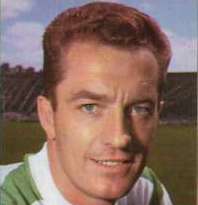
STEVIE CHALMERS…scourge of goalkeepers.
If goalkeeper Billy Ritchie fumbled the ball, Chalmers was in on top of him immediately. He was a frontman who fed on scraps, but had a great awareness even when things were in chaos around him with bodies, arms and legs flying around with great abandon. Chalmers, like Hughes, possessed breathtaking acceleration. He fondly recalled that day. He said, ‘Everything changed rather dramatically after the interval. I scored three and Bobby Murdoch and Charlie Gallagher pitched in with two thundering long-range efforts.
‘It’s a huge understatement to say I enjoyed knocking in three against our oldest rivals, but can you imagine my surprise the following day when all the headlines were given to John Hughes! I score three and Yogi gets the praise – it’s just not fair. Seriously, though, Yogi was immense in the second-half of that game and I think he actually set up all my goals after some fabulous runs down the left flank. He changed his boots at half-time and put on sandshoes. That was highly unusual in those days, but Yogi was complaining about the slippery surface and decided to change his footwear, casting aside the more traditional boots. It worked a treat. I had a quiet chuckle as I left the ground afterwards, making my way to my car. A Rangers fan was talking to a Celtic supporter and I heard him say, “Whit de ye think of that?” Then he added, “Two bad lots!” Well, he got it half right!’
Astoundingly, Chalmers’s hat-trick that day is a record that stands forty-six years on. He added, ‘I still find it hard to believe I am the last Celtic player to score three goals in an Old Firm league game. Records are there to be broken, so get out there someone and do the business for Celtic. There have been a few close calls, of course, since then. Willie Wallace, Kenny Dalglish, Charlie Nicholas, Brian McClair and Henrik Larsson have all claimed two, but no-one has hit a hat-trick. I find that simply incredible. Mind you, my wee pal Bobby Lennox continually reminds me he scored three in a Glasgow Cup-tie at Ibrox in 1966 and Harry Hood also managed a trio against Rangers in the League Cup in 1973. But, as far as the league is concerned, I am still out on my own.’
Something else that might have been perceived as being incredible was the fact that Joe McBride did not get on the scoresheet when the goals were raining into the Rangers net. And, continuing in the incredulous strand, McBride’s record will show he never scored against the Ibrox side while wearing the green and white hoops.
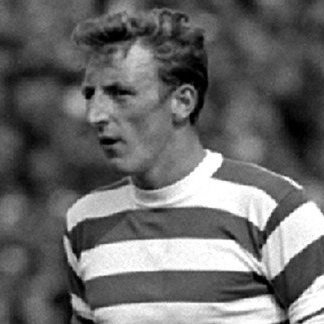
TOMMY GEMMELL…a one-man band.
Celtic were on the receiving end in the most bizarre of circumstances when they lost 3-2 to Hearts at Tynecastle. The squad had been delayed in their return from a 1-1 draw with Kiev Dynamo and only arrived back late in Glasgow on the evening prior to the game. The Cup-Winners’ Cup-tie had been switched from snowbound Kiev, where the ground was unplayable, to Tblisi on the Wednesday. Celtic prepared to leave the following morning, but atrocious weather conditions saw them marooned in Tblisi and were further delayed before getting a flight to Moscow. ‘We were stuck on that plane for hours,’ recalled Tommy Gemmell. ‘The entire party were getting pretty bored, so there was only one thing for it – I put on an impromptu one-man show. I was singing, telling jokes and, at least, it helped to while away an hour or so. I even got a round of applause afterwards. Showbiz’s loss was football’s gain!’
Conditions relented and Celtic were eventually allowed to fly out of the Russian capital. There was the strange sight of Celtic players training at Parkhead under floodlights on Friday at 11pm, sixteen hours before kick-off. The club asked for the match in Edinburgh to be postponed, but the Scottish League, in its infinite wisdom, refused their more than reasonable request and ordered them to play the following afternoon. It was an understandably leg-weary Celtic team that faced Hearts and it was no surprise they lost 3-2 with Willie Wallace scoring two of the Hearts goals. Jim Craig, sent off against Kiev, was missing and Billy McNeill took over the right-back role with John Cushley deputising at centre-half. It was a disjointed performance from a jaded outfit and goals from McBride and Hughes couldn’t save Celtic from a narrow defeat.
McBride hit a hat-trick in the 6-0 victory over Falkirk, on target for a fourth successive league game. But the wheels came off in the most alarming and unexpected fashion when a goal from George Peebles gave Stirling Albion a 1-0 victory at Annfield in February. ‘Big Jock was raging,’ recalled Auld. ‘He hit the roof after that one. In truth, we should have wiped the floor with Stirling, but we couldn’t get into our natural rhythm that day. I remember the muddy pitch cutting up really badly. I’m not making excuses, but that can be a great leveller in terms of teams’ abilities. Back then, we were aware that some clubs didn’t bother rolling their pitches when they were due to play Celtic. They would leave them rutted and, of course, that didn’t help our passing game.
‘Others watered their pitches to the extent they were virtual swamps and we would turn up at these places and wonder if it had been raining all week in that part of Scotland. Jock always wanted the ball being moved around on the carpet and that particular afternoon against Stirling it was impossible to play in that manner. It was a day for back-to-front football, the ball being belted from one end to another, but, of course, that was not the Celtic way. The dreadful conditions cut us absolutely no slack with Jock.
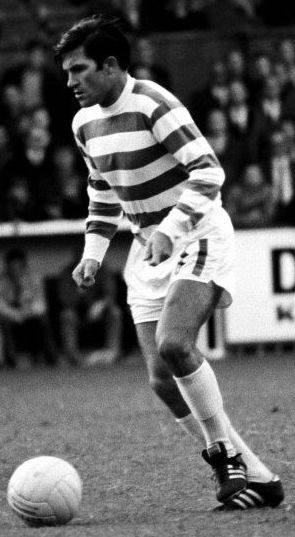
A MASTER CRAFTSMAN AT WORK…Bertie Auld on the ball.
‘We had all seen him angry, but he went up like a volcano after that defeat. “Totally unacceptable,” was what he kept repeating. Then he would break off to berate an individual. He never thought twice about giving anyone a dressing down in front of their team-mates. I was on the receiving end of a few, I can tell you. Big Jock got his message across to us loud and clear. He wanted that league championship. The Scottish Cup and the League Cup victories were all well and good, but the title was the big one and Jock had his sights on it.’
In the next match, Celtic thumped Dundee 5-0 with McBride slamming in another hat-trick, his fourth of the season. The pursuit of the flag was interrupted by Scottish Cup action and the following Saturday Celtic were involved in a dramatic 3-3 draw with Hearts at Tynecastle. Goalkeepers Ronnie Simpson and Jim Cruickshank were the busiest men on the pitch as both forward lines opened fire with a verve and gusto. Four days later the clubs locked horns again in the replay at Parkhead and this time Celtic made no mistake with a 3-1 triumph.
Gemmell remembered, ‘Those two games against Hearts probably won’t feature too prominently in Celtic’s history, but they were two very important fixtures for us. Hearts were an exceptionally good team at the time and had been unfortunate the previous season when they missed out on the league title on the last day of the season. Kilmarnock went to Tynecastle that afternoon knowing they required a 2-0 victory to clinch the flag on goal average.
‘Hearts, at home, were favourites. It was unthinkable they would fall at this hurdle in front of their own fans. That’s exactly what happened. Killie got the 2-0 winning margin they needed and the title was on its way to Rugby Park. Hearts had put so much into the season and had ended with nought. So, it was fairly obvious they wanted something from this campaign and their players, including Willie Wallace who would become one of my best mates, were right up for it. Our 3-3 draw could have gone either way, it was that sort of game. And we had to be at our best for the second meeting.
‘I recall both those ties being packed with incident and I can also remember two excellent displays from Jimmy Johnstone. We all knew he was a brilliant wee player and he could skin any full-back when he put his mind to it. Believe me, I know what I’m talking about because I faced him often enough in training. The only thing he lacked was consistency, but that was something he was achieving on a match-by-match basis under Big Jock. He drilled it into him there was little point in skipping past three players if there was no end product’
Before Jock, Jinky could beat a defender and then double back to beat him again. He would even do it a third time and, of course, the fans lapped it up. He was pure entertainment, but it must have been a wee bit frustrating for the likes of Stevie Chalmers, Joe McBride and the others queuing up in the penalty box, jostling for positions waiting for the ball to be finally delivered. Sometimes it arrived, sometimes it didn’t. Jock worked hard with Jinky to get him to realise football was not all about flicks and tricks; it was about putting the ball in the opposition’s net. Once the penny dropped with the Wee Man, he became a far better and more consistent player. He must have been one of the first names on Big Jock’s teamsheet on matchday. Along with me, of course!’
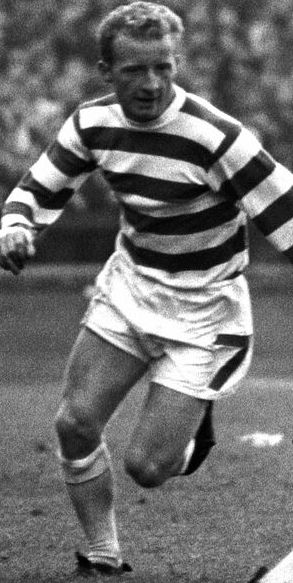
JIMMY JOHNSTONE…Lord of the wing.
St.Johnstone provided the opposition in the next league encounter on 12 March in Glasgow and they gave Celtic a fright with an unexpected attacking formation. At this stage, Jock Stein’s side had been used to teams arriving at Parkhead and trying to shut up shop in front of their goalkeeper. Gemmell added, ‘It became normal for the opposing right-winger to mark me rather than the other way around. A few of them would say, “Take it easy on me today, Tommy.” I lost count of the outside-rights who didn’t even come into our half when we were playing them.’ The Saints, beaten 4-1 at home by the same opponents earlier in the campaign, decided to have a go at Billy McNeill and Co. It ended 3-2 for Celtic, but after an exhausting ninety minutes the home side realised they would face a stern test in their quest for the championship. Clearly, Rangers also had their eye on the main prize and had spent heavily in bringing in Alex Smith, from Dunfermline, and Davie Smith, from Aberdeen. The Smiths, not related, cost a combined fee of £100,000, yet again a colossal amount of money at the time. There was a hiccup along the way for Celtic when they faltered in a goalless draw against Hibs at Easter Road, only the second occasion they had failed to score in a league game throughout the campaign.
Lennox and Johnstone, massive friends off the field, shared the goals in a 2-0 victory over Morton at Cappielow and the pair staged an action replay the following Wednesday in a 2-1 win against Dunfermline at home. On the same evening in Glasgow, Rangers wound up their league season with a 4-0 triumph over Clyde, their seventh league victory on the trot. They had racked up fifty-five points, the same total as Celtic who would play their last league game against Motherwell at Fir Park on 7 May. Jock Stein’s men were already as good as champions. They had netted 105 goals and conceded thirty against Rangers’ 91 for and twenty-nine against. It would have taken the most unbelievable, unthinkable nosedive in Celtic’s history to allow the Ibrox men to claim the crown. It didn’t happen. Bobby Lennox turned in a right-wing cross from Jim Craig in the last minute past Peter McCloy, who would later sign for Rangers, for the only goal of the game. After an absence of twelve years, the flag was heading back to the east end of Glasgow.
Craig recalled, ‘Like Big Tommy on the other flank, I loved to get forward. He took most of the headlines, of course, because of his thunderous shooting power and his spectacular goals, but I would like to think I contributed to the cause, as well. The Motherwell game was a case in point. We knew the league was in the bag and there was only a minute to go, but I still wanted to get down the wing and keep the pressure on our opponents. When I got forward late on, I looked up and there was Bobby Lennox, as usual, in a great position. His speed of thought kept pace with his legs and he was unmarked at the near post. I knocked it across and he got in before the Motherwell defence knew what was going on. He only had to touch it into the net from about two yards. Bobby was deadly from that range!’
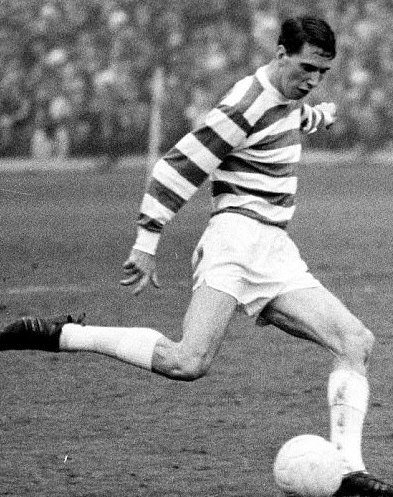
JIM CRAIG…creator of many Celtic goals.
‘The goals were spread around the team and the side did not rely on me to score,’ remembered Lennox whose goal against Motherwell was his fifteenth of the campaign. ‘With the exception of Ronnie Simpson in goal and John Clark as our defensive rock, everyone was capable of getting a goal or two. Tommy Gemmell, to my mind, was an exceptional left-back. He revolutionised that position in our team. Funnily enough, for a guy who was principally a defender, he used to admit he couldn’t tackle too well. He didn’t have to as other teams used to fear him as he bombed forward, threatening to use that mighty right peg of his.
‘I could go through the entire team: Jim Craig might not have claimed many goals, but he certainly set up his fair share; Bobby Murdoch could score goals from distance; Billy McNeill was known to get the odd headed goal or two; Bertie Auld knew where the opposition’s net was; Jimmy Johnstone, Stevie Chalmers, Joe McBride and myself were always good for double figures and Willie Wallace would add to that goal threat when he arrived from Hearts. There was a lot of pace about the side, too. Just look at the forward line that won the European Cup a year later. It was Johnstone, Wallace, Chalmers, Auld and myself. All of us had played as out-and-out wingers at some stage of our careers. Back then, you had to possess a fair turn of speed to occupy that position.’
Gemmell recalled, ‘That was a fabulous day. As I have already said, I would have loved to have signed for Motherwell, my hometown team. That was my dream until Celtic came on the scene. So, winning our first league championship since 1954, when I was eleven-years-old and still at Craigneuk Public primary school, at the ground where my dad used to take me when I was a kid, was simply wonderful.
‘When you consider what Celtic had been through during the barren years, this was an unbeatable feeling. We didn’t require champagne that night to get high. In just over a year the club had won a Scottish Cup in 1965 and the league and League Cup in 1966. Phenomenal stuff. When Wee Bobby stuck that one into the Motherwell net I wasn’t even thinking about us playing in the European Cup the following year and what all that would entail.’
Celtic had become fixated on the championship crown, especially after losing 1-0 to Rangers in the Scottish Cup Final replay a couple of weeks earlier. Jock Stein’s men were huge favourites to lift the trophy for the second successive season by the time the Final rolled round. Kai Johansen, the right-back destroyed by John Hughes in the New Year walloping, must have gone into the tie with a fair amount of trepidation.
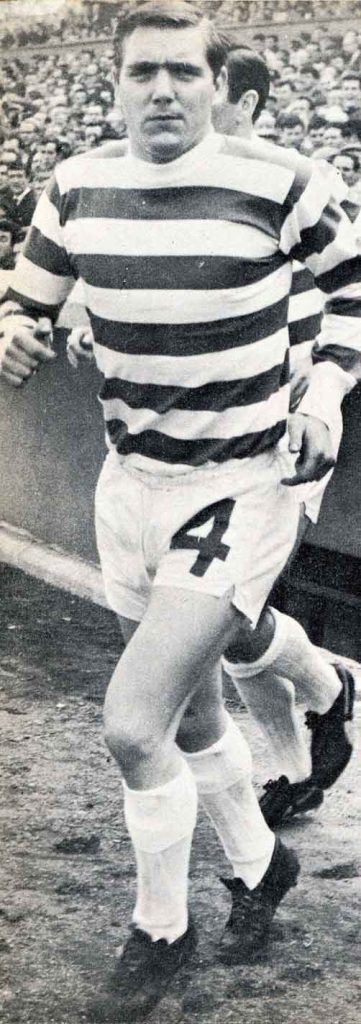
BOBBY MURDOCH…possessor of the precision pass.
The Celtic team in 4-2-4 formation read, Ronnie Simpson; Ian Young, Billy McNeill, John Clark and Tommy Gemmell; Bobby Murdoch and Charlie Gallagher; Jimmy Johnstone, Joe McBride, Stevie Chalmers and John Hughes. Seven of that line-up would be good enough to become part of the first British team to claim the European Cup against Inter Milan a year later, but, on this occasion, they rarely pressurised Billy Ritchie or his defenders. The infamous Hampden swirl, an unseen menace hardly conducive to accurate passing, was in full force on Saturday 23 April.
The nearest Celtic came to scoring was a header from skipper McNeill that saw the ball clatter off the face of the crossbar. There was a heart-stopping moment, too, when Simpson left his line to claim a harmless-looking left wing cross. In normal circumstances, this would have been meat and drink to the veteran. The ball, though, held up in a gust of wind, Simpson’s timing was slightly off and he fumbled the cross right at the feet of Jim Forrest, so taken aback by the unexpected gift from the normally reliable custodian that he failed to react and the keeper scooped the ball away at the second attempt.
That miss cost Forrest his place in the replay four days later with George McLean taking over at No.9. Stein dropped right-back Young and midfielder Gallagher with Jim Craig and Bertie Auld being recalled. Lennox missed both games through injury and he was in the Hampden stand the evening the Ibrox side won 1-0 with a late whizzbang effort from right-back Johansen, enjoying a better ninety minutes than he did almost four months earlier. Lennox said, ‘I thought my team-mates outplayed Rangers in the first match and not too many people gave our old rivals much of a chance in the replay.
‘However, Johansen’s goal removed the Cup from our trophy cabinet and that was a sore one to take. That was one of those games that comes along every now and again where you know fate is against you. I could never be called a defeatist, but I have to admit there are occasions when you instinctively know things will not run your way. I remember Celtic storming straight back at Rangers in that game after Johansen’s goal. If I recall correctly, Big John Hughes ran down the left wing and pitched over a peach of a cross. In the busy penalty area, Joe McBride was first to react and thumped in a ferocious header. Their keeper, Billy Ritchie, hadn’t a clue where the ball was. As it happens, it struck him on the shoulder, flew upwards, came down, gently ran along the top of the crossbar and, with what looked like half the Celtic team queuing up on the goal-line to knock it in, suddenly veered in the wrong direction, as far as we were concerned, and flopped on top of the roof of the net. That just about summed up Celtic’s luck in both those matches.’
Dame Fortune wasn’t smiling on Celtic, either, on the European Cup-Winners’ Cup front. It all started brightly enough with a runaway 6-0 triumph over Go-Ahead Deventer in Holland. Ian Young played at right-back in the first leg, but Jock Stein brought in Jim Craig for his debut in the return game. Craig recalled, ‘I still chuckle when I look back at the day I made my first appearance. I remember it well. Big Jock, as thoughtful as ever, had a habit of selecting games in which younger players could get a chance without too much pressure on them and he chose well in this one with Celtic six goals ahead.
‘The evening before the home tie, I was told I would be playing. I was twenty-two-years-old at the time and still doing my dentistry studies while playing part-time. Excited? You can bet on it. I will always remember waiting for a bus, the No.64 to Auchenshuggle, in Argyle Street along with a bunch of Celtic supporters to take me to the east end of Glasgow.
‘I was sitting among these guys and they were talking about who might be playing for Celtic that night. No-one took a blind bit of notice of me. I was totally unknown. I felt like telling them I would be turning out at right-back for their favourite team, but they probably wouldn’t have believed me. A Celtic player on a bus? Just an hour or so away from kick-off? Don’t be daft!
‘However, I did indeed make my first appearance in those famous hoops and a single goal from Joe McBride gave us a rather emphatic 7-0 aggregate triumph. I would like to say I played my part in that victory! I must have impressed Big Jock – I was promptly put back in the reserves with Ian Young returning to the No.2 berth for the next game, a 5-2 win over Hearts.’
Celtic were drawn away from home for the first leg of their second round tie against Denmark’s Aarhus in November. McBride was on the mark again with a typical effort in a 1-0 win, but Stein was impressed with the Danish keeper called Bent Martin. McNeill and Johnstone stuck two past him in the return match in Glasgow and, shortly afterwards, the agile and athletic No.1 signed for the club. Stein saw him as the natural successor to Ronnie Simpson, but the thirty-something was in no hurry to don the cardigan and slippers and look out the pipe. Martin, in fact, never played a competitive first team game for Celtic and, after a year, moved to Dunfermline.
The excellent Russians Kiev Dynamo were the quarter-final opponents with the first game at Parkhead. Celtic turned in a master class in front of their own supporters, winning 3-0 with goals from Murdoch (2) and Gemmell. The buccaneering left-back remembered, ‘Big Jock actively encouraged everyone to shoot on sight. He was very much of the mind that your shot might not go in, but it might be deflected in the direction of, say, Stevie Chalmers, Bobby Lennox, Joe McBride or Willie Wallace and nine times out of ten they would tidy things up. The amount of goals we scored from about six or eight yards back then was unbelievable.’
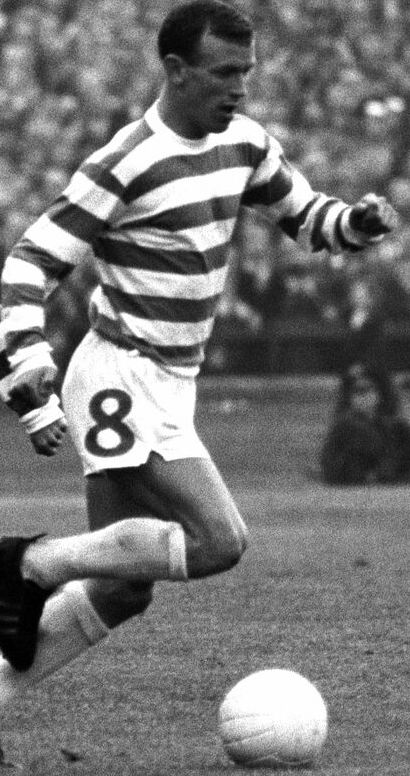
BOBBY LENNOX…’Buzzbomb’ to his team-mates.
Gemmell sizzled in another unstoppable drive in the return leg, giving Celtic a 1-1 draw and a decisive 4-1 aggregate triumph. Next up was Liverpool, managed by Stein’s great friend Bill Shankly. Gemmell said, ‘Big pals, yes, but massive rivals, too. They were both former miners and they talked the same language, but friendship went out the window over those two games, especially the second leg at Anfield. I think it would be fair to say we annihilated them 1-0 at Parkhead. We absolutely hammered them and, to this day, I’ll never be able to understand how we didn’t manage to win 5-0 or 6-0.
‘They hardly came into our half all night. We just went straight at them. I don’t think they had ever been on the receiving end of the punishment they took that night. But it was amazing that we had to settle for just one strike from Bobby Lennox to give us a 1-0 advantage. Honestly, if that had been a boxing match the referee would have stopped the fight before half-time. We tore them apart and, to a man, they all looked mightily relieved when the referee blew for full-time, I can tell you. It was one of those games where shots were just inches off target, flying over the bar or sweeping past the post. We had won, but we weren’t celebrating because we knew we should have scored so many more to put the tie out of sight. Liverpool remained in the competition and still in with a chance, when they should have been well out of contention.’
Billy McNeill looked back, ‘We went to Anfield for the return leg and I can tell you we were not one bit afraid. We reasoned we had played them off the park in Glasgow and we could do something similar on their own patch. Everything seemed to be going okay until they were awarded a free-kick on the hour mark about thirty yards out. As I recall, it was a filthy night on Merseyside and Tommy Smith stepped up to take it. He fired the ball goalwards and, unfortunately for Ronnie Simpson, it took a wicked bounce off the muddy pitch. Ronnie looked as though he had it covered, but it actually seemed to pick up momentum as it hit the turf in front of him and flashed low into the corner of the net. We couldn’t believe it. They were level with us.
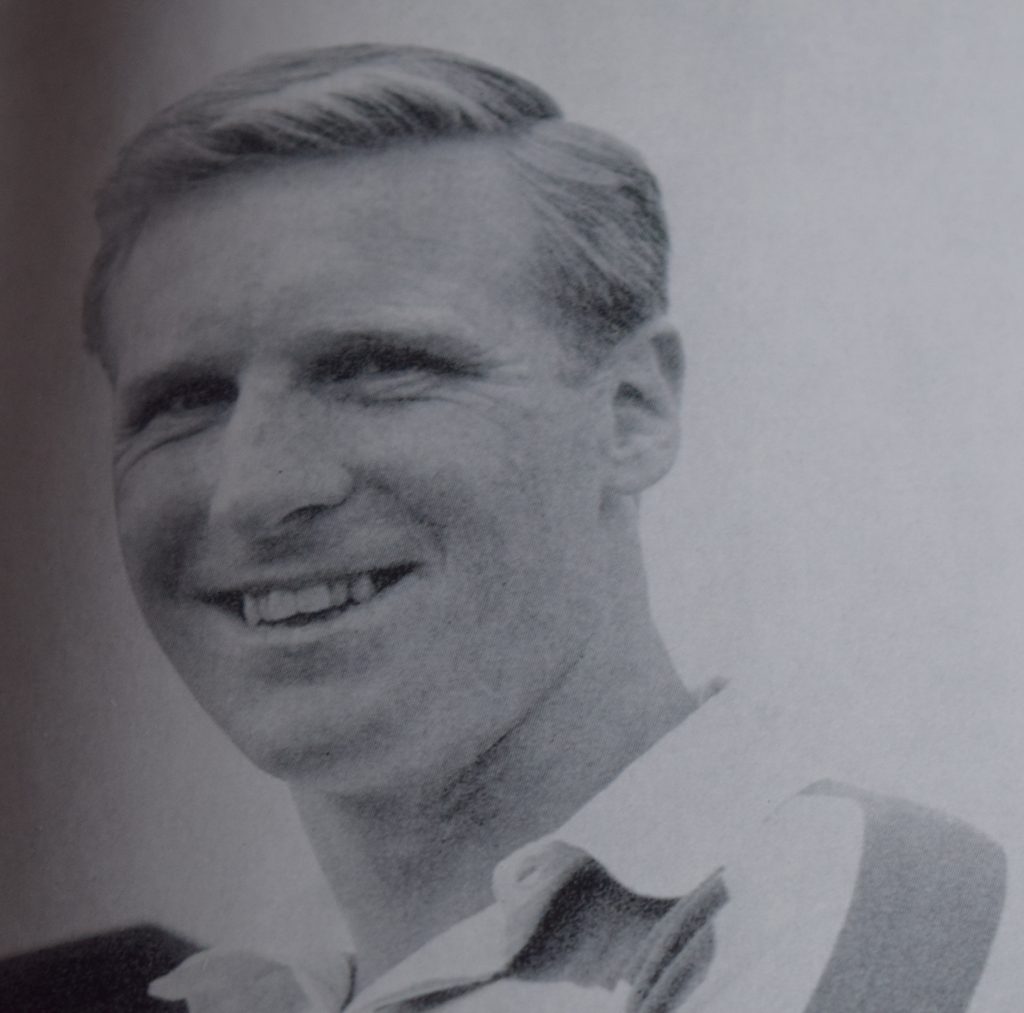
BILLY McNEILL…so close to European glory in 1966.
‘They had contributed so little over the two-and-a-half hours of play and they were drawing with us. It got worse five minutes later when Geoff Strong got up really well to power an unstoppable header away from Ronnie. There was nothing flukey about that effort – I would have happily claimed it as one of my own. However, the real controversy was just around the corner.
‘Near the end, Bobby Lennox turned the ball wide of their keeper Tommy Lawrence and left-back Gerry Byrne on the goal-line and into the net. A goal, surely? Alas, not according to the man who mattered, the Belgian referee Josef Hannet. He ruled it out for offside which was a fairly strange decision when you consider they had a defender behind their goalkeeper.
‘In actual fact, there is absolutely no way the goal shouldn’t have counted. We didn’t get any consolation much later when Hannet admitted, after watching reruns of the incident, that he had, in fact, got it wrong. Thanks, ref – that was just another for the growing collection of Bobby Lennox injustices. Wee Bobby was so quick off the mark that he was too fast for a lot of linesmen. I wonder how many legitimate goals my wee pal scored that were ruled out. He could probably have doubled his goal tally.
‘On that occasion in Liverpool, we were furious. So, too, unfortunately were our supporters and a few bottles were thrown onto the pitch. I would never condone such actions, but their frustrations were understandable. They had just seen a perfectly legitimate goal ruled out and their team was out of Europe. What made it all the more galling was the fact that the European Cup-Winners’ Cup Final was due to be played at Hampden Park that year. Can you imagine the scenes if we had played in that game? Dear old Hampden would have been rocking to its foundations.
‘As it turned out, Liverpool took our place and I think they must have used up all their luck against us in the previous two games. They lost 2-1 in extra-time to the West Germans of Borussia Dortmund and, ironically, the winning goal came from Ron Yeats, who was one of my main challengers for the centre-half slot in the Scottish international team at the time. I remember a Borussia Dortmund player, a guy called Reinhard Libuda, lobbing Lawrence and the ball hitting the crossbar. Yeats, running back in an effort to clear off the line, couldn’t get out of the way of the rebound and the ball came down, struck him and bounced over the line. Trophies are won and lost in such bizarre moments.’
So, the 1965/66 season was completed with the league championship and League Cup in the Celtic trophy room with successes in the Scottish Cup and European Cup-Winners’ Cup just eluding them. However, a wonderful voyage was about to embark and it all kicked off far from home shores. Bobby Lennox believes the summer tour of North America was another turning point in the continuing Celtic success story.
The likeable and laidback Saltcoats-born lad said, ‘I have often stated that Celtic really gelled and came together on that trip. It was a masterstroke by someone at Celtic to take us away for about five weeks. The players got to know one another even better than is possible when you are just turning up for training and, of course, playing on matchday. We all enjoyed the experience, but we also knew we were there to work. This was no holiday and Jock Stein was still getting to really know the squad of players he had inherited. We all wanted to impress him and I think I did well enough – I managed to score nineteen goals in eleven games! Okay, we did play a few select teams from Bermuda, New Jersey and St.Louis, but we also took on Spurs three times. The London side were a really top outfit at the time and they went on to win the FA Cup in 1967, beating Chelsea 2-1 in the final.
‘I think they were a bit annoyed that they couldn’t put one over on us. We beat them 1-0 and then 2-1 before we played them for a third time and they managed to get a 1-1 draw. These were important games for us. They were taking us to another level and it didn’t do our confidence any harm, either. Tommy Gemmell pestered Big Jock into letting him play at centre-forward in one of our games – I think it was against the Hamilton Select – and The Boss eventually let him lead the attack. As I recall, Big Tommy did well enough, netting a hat-trick in an 11-0 triumph. Thankfully, though, he accepted that left-back was his best position and the ‘experiment’ was never tried again!’
Gemmell said, ‘Yes, it’s true I did fancy myself as a bit of a goalscorer because, remember, I did play as an attacking outside-right in my amateur career. I thought the guys up front got it easy. We did all the hard work at the back to set them up with chances and they got all the glory when they scored the goals! I wanted some of that. I had said to Big Jock to give me a chance up front, but I have to admit I knew I was better at the back where I could come forward and hit shots at goal from long distance.
‘I was two-footed, but my right was the stronger. When I played at right-back I often found myself getting to the bye-line and simply sending over crosses. I rarely came inside to have a shot with my left foot and, anyway, more often than not, I had Wee Jinky in front of me and he was totally unpredictable. I could cut inside at the same time he decided to do likewise. When Big Jock moved me to left-back he encouraged me to come in on my right foot and have a dig. I enjoyed my game against the Hamilton Select, but Bobby Lennox, Stevie Chalmers and Co were never under any serious threat from me for a position in the frontline.’
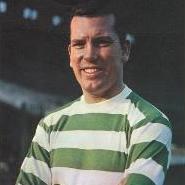
JOE McBRIDE…in stupendous striking form.
Lennox added, ‘That pre-season tour of The States should never be underestimated in what it meant to the club. There was a real sense of camaraderie among the players and I still believe that’s what made that period so memorable. I used to look around our dressing room at the time and see Big Billy preparing for a game. Then I would look at the Wee Man. Then Big Tommy. Then Bobby Murdoch. Then Wee Bertie. I just looked around the entire dressing room and thought: “Who can beat us?” We were afraid of no-one. We went out onto that pitch expecting to win. It was a great attitude. We really were a good team.’
Gemmell chipped in, ‘I’m not being disrespectful to our opponents back then, but when we were discussing the game in the dressing room before kick-off, it wasn’t about players asking, “Could we win?” It was more a case of we should score three, four or more goals against this opposition. That’s not meant to be conceited or big-headed, it was just a fact. Genuinely, we believed we could score a barrowload in most matches and, I agree with Bobby, when you looked around the place and saw the players you would be lining up with that day, then who could blame us? It was all about confidence and we had loads of that priceless commodity.’
Joe McBride was in stupendous striking form when Celtic kicked off the defence of the League Cup in the 1966/67 season. The uncompromising frontman claimed thirteen goals in the first five games, including four in an 8-2 romp against St.Mirren, five in two games against Clyde and four in two ties against Hearts. Gemmell remarked, ‘Joe McBride was an absolutely brilliant goalscorer. Joe didn’t bother with any of the niceties of football or the Fancy Dan stuff. He just wanted to hammer the ball into the net as often as possible. He didn’t care how he scored. It could have gone in off his backside and it wouldn’t have mattered. He had fabulous strength, too.
‘He was burly and impossible to knock off the ball. You would see defenders bouncing off him when he got into his stride. Joe wasn’t tall – around 5ft 9in – but he was superb in the air. He threw himself at everything that came into the box. He was totally fearless and goodness only knows how many goals he would have scored for Celtic if it hadn’t been for the knee injury that derailed his career. I think he would have given Jimmy McGrory a run for his money.’
As Celtic headed for a League Cup quarter-final date with Dunfermline, they met Rangers in the second league game of the campaign. After a mesmerising start to the game, Celtic were two goals ahead by the third minute. Johnstone flashed over a right wing cross in the first minute, McBride took a fresh air swipe at the ball and Auld followed up at the back post to fire it beyond Billy Ritchie. Moments later Murdoch hit a sublime second, executing an exquisite finish that was his trademark. The masterful midfielder was just outside the penalty box when he looked up and opted to go for precision instead of power. He neatly dinked the ball over the defenders in front of him and it soared high into Ritchie’s top left hand corner of the net. Rangers couldn’t come back from that startling double blast and the game finished 2-0.
Celtic were on fire and McBride, apart from confrontations with a certain team from Govan, couldn’t stop scoring. He netted ten as the club racked up twenty-eight goals in a scintillating six-game winning run. They took seven off Stirling Albion, six off St.Johnstone and five each against Hibs and Ayr United. They had to be content with three against Airdrie and two against Dundee. After the bleak early sixties, the Celtic fans were thoroughly enjoying themselves. St.Mirren’s unconventional goalkeeper Denis Connaghan, later to sign for his boyhood idols, was in defiant mood on the afternoon of 5 November at Parkhead. The extrovert custodian had one of those days when the ball was sticking to him. Peter Kane scored for the Paisley outfit, but another long-range effort from Gemmell, playing at centre-half in place of the injured Billy McNeill, gave Stein’s side a point. It was to prove a mere blip.
A fortnight later brought one of the most remarkable encounters in living memory against Dunfermline at East End Park. The Fifers were leading 4-2 with fifteen minutes to play. A guy called Alex Ferguson was making life difficult for the Celtic back lot. Ferguson’s natural style was that a bustling, energetic frontman and he wasn’t afraid to put himself about. As a matter of fact, he had the distinction of having a Celtic Supporters’ Club named after him.
During his days at St.Johnstone, the centre-forward netted a hat-trick in a remarkable 3-2 victory at Ibrox. He was immediately rewarded by Celtic fans looking for a name for their new club. Presumably, they changed it in 1967 when Ferguson actually joined Rangers! The player was up for the encounter with Celtic, though, and had netted two past Ronnie Simpson with the home side looking to inflict the first league defeat of the season on the Parkhead outfit.
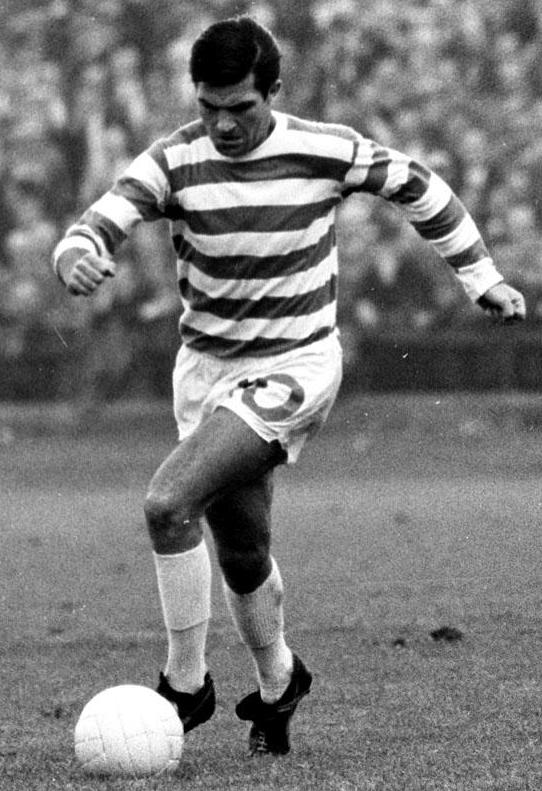
BERTIE AULD…the master of all he surveyed.
Then, in a truly memorable grand finale, Celtic, who had scored earlier through McBride and Murdoch, launched an unforgettable and furious fightback on the Dunfermline goal. Johnstone and Auld scored to pull it back to 4-4, but, even more astonishingly, Celtic then went for the winner. The game was in its fading moments when Dunfermline centre-half Roy Barry conceded a stonewall penalty-kick when he took off Superman-style to fist away a cross that was arrowing in on McBride’s head. East End Park held its breath as McBride stepped up to take the award. The revival was complete when he belted the ball high into the net. Gemmell, who played right-back that afternoon, said, ‘What a game that was. I think it emphasised the fact that this Celtic team never knew when it was beaten. This was a line-up comprised of winners; we were never going to accept second best. Dunfermline played really well that afternoon in, as I recall, fairly awful conditions. It was a stamina-sapping playing surface after some heavy rain, but we just kept going. Aye, a lot of teams might get it back to 4-4 and think that was good enough. Not us; we wanted to win and there was still a minute or two left to go and we were on a roll, so we probably fancied our chances.’
December opened in the most unusual of fashions, a goalless draw with Kilmarnock at Rugby Park. It was a strangely lethargic performance from a Celtic team that was unrecognisable from that one that had stormed to a sensational victory over Dunfermline. Bobby Ferguson became the first goalkeeper to shut out Celtic in the league in season 1966/67 and Aberdeen’s Bobby Clark became the second four months later in another scoreless confrontation. Normal service was resumed with an emphatic 6-2 win over Partick Thistle with Willie Wallace netting two, his first goals for the club after his £30,000 transfer from Hearts a fortnight earlier.
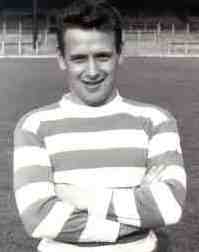
WILLIE WALLACE…brought in from Hearts.
Wallace’s move to Celtic came as a bit of a surprise because many thought he was destined for Rangers. He revealed, ‘I had been in dispute with Hearts and just wanted a transfer. Newcastle United and Stoke City were showing an interest, so it looked as though I would be packing my bags and heading across the border. Then Jock Stein came on the scene and he didn’t have to try too hard to sell Celtic to me.
‘As soon as I realised there was a chance of going to Celtic Park and working alongside Big Jock, there was no choice to make. Newcastle and Stoke City, without any disrespect, had no chance of getting my signature on transfer forms. Let’s try to clear up a few mysteries that have followed me around for forty years or so. I was not, and never had been, a Rangers supporter. The story goes that I was poised to sign for the Ibrox side until Big Jock made his move. There was a tale that the Celtic manager waited until Rangers were out of town and playing in a European tie before he quickly sealed a deal with Hearts. Sounds like a good yarn, but it simply didn’t happen that way.
‘I don’t know if Rangers were ever interested in me at all. Okay, my whole family were Rangers fans and they would have loved for me to sign for them, but I was overjoyed when I got the opportunity to move to Celtic. Yes, some of my family didn’t share my enthusiasm for all things Celtic back then. Actually, I admit I did see a lot of Rangers in the fifties because my Uncle Jim just happened to be the President of the Kirkintilloch Rangers Supporters’ Club. However, I spent more time watching Falkirk at Brockville which was just up the road from where I lived in Larbert. But I am a Celtic fan now, you can be certain of that. Once you have mixed in that company, you couldn’t be anything else.
‘I live in Queensland in Australia these days, but I still bump into hundreds of Celtic supporters. They are everywhere and that fact simply underlines the worldwide appeal of the club. I have to say I was always made welcome at Celtic right from day one. I was aware of the religious divide that existed in the West of Scotland, but it never bothered me and, anyway, Celtic had always signed Protestants. Big Jock, for a start. And there was me, Tommy Gemmell, Ronnie Simpson and Bertie Auld among the Lisbon Lions. I may have gone to a Proddy school, but, after they came knocking at my door and took me to Glasgow, I was Celtic through and through. Still am to this day.’
It is a general misconception that Wallace was bought to replace McBride after his dreadful injury at Aberdeen on Christmas Eve. Not so. Wallace actually played three times alongside the unfortunate McBride, who, despite missing the rest of the season after the Pittodrie game, completed the campaign as the country’s second top scorer with thirty-five competitive goals – one behind team-mate Stevie Chalmers. It was devastating finishing from a player thoroughly enjoying performing in the hoops. Auld said, ‘It was an absolute travesty what happened to Joe against the Dons. He just couldn’t stop scoring and then along came that knee injury. Everyone felt so bad for Joe. We knew this was going to be a massive season for us and Joe was eager to play his part. To score so many goals before the turn of the year was simply sensational and you can only hazard a guess as to what he would have finished up with if he had stayed clear of injury.’
McBride’s season ended abruptly in the 1-1 draw at Aberdeen where Lennox took over the mantle of goalscorer. It’s difficult to say if the Celtic players suffered a reaction to such a popular player being sidelined for the rest of the season, but they didn’t hit top gear a week later in their first defeat of the campaign, losing 3-2 to Dundee United at Tannadice. It was certainly an off-colour performance from Celtic. Oddly, Jock Stein’s side were to lose only two league matches during that campaign, both 3-2 against the Tayside outfit. So, 1966 drew to a halt with an unexpected loss, but there had been something to celebrate in October when Rangers were beaten again in the second successive League Cup Final. Celtic were unstoppable in the competition and won all ten of their ties while collecting thirty-five goals with McBride notching fifteen of the total.
They simply scorched through to the Hampden final with the most memorable tie being a 6-3 triumph over Dunfermline in the quarter-final first leg at Parkhead. Auld scored two that night and recalled, ‘Big Jock was forever telling me my right foot was only good for standing on. I used to say to him, “Look, Boss, when you’ve got a left peg like mine you don’t need a right.” So, I was particularly happy that night to score with a right-foot shot from about twenty-five yards. I looked up, saw my opportunity and simply hit the ball sweetly. It flew high into the net and then I made a beeline for the Celtic dug-out to wave my right foot at Big Jock. The fans must have been wondering what that was all about!’
Celtic eased past Airdrie, winning 2-0 in the semi-final, to set up another October date with Rangers. Auld recalled, ‘Old Firm matches, of course, were always special although they weren’t always classics. They could be enjoyable, they could be exasperating. And, yes, they could be explosive. Celtic fans would be coming up to you days before the game and imploring, “Beat them for us, Bertie”. Or “Don’t let us down, please”. So, no pressure there, then. If you weren’t prepared mentally or physically for these ninety minutes of combat they would overwhelm you. There was a genuine rivalry among the players, but a lot of us were friends, too, off the park. We would bump into each other at so many functions and we always got on well.’
‘There could be a fair bit of banter in these tussles as well as a lot of tension. John Greig, the Rangers captain, also revelled in these encounters. On one occasion, he went over to the Celtic end to fetch the ball for a throw-in. A voice from the crowd exclaimed, “Hey, Greigy, I didn’t realise you were such a dirty bastard.” Quick as a flash, Greig replied, “Have you not been watching me all season!” Underlining what I said about Davie Provan, Greig was once involved in a tackle on Bobby Lennox that snapped our player’s ankle. Bobby was the first to say it was an accident. These things happen in a contact sport.’
Auld came into the Celtic first team when Rangers ruled the roost in Old Firm encounters. He added, ‘Between September 1958 and January 1960 I played four league games against them and didn’t win one. We drew the first 2-2 at Parkhead with goals from Eric Smith and Bobby Collins. The next was the New Year’s Day game in 1959 at Ibrox and, despite a goal from Bertie Peacock, we went down 2-1. The next came in September the same year and we lost 3-1 with Mike Jackson getting our consolation effort. And the misery continued in the next clash when I played inside-right in a team beaten 1-0 at home. Around that period Rangers regularly beat Celtic and you can’t argue they were the better team with better players. They were also better organised which certainly wasn’t the case at Parkhead until Big Jock arrived to turn everything upside down.’
So, come the 1966 League Cup Final meeting on 29 October with 94,532 cramming into Hampden, Celtic were favourites after winning the opening league game of the season with a fair degree of ease, those two early goals from Auld and Murdoch enough to see off the Ibrox outfit. Once again, the game was settled fairly early when Auld pinged in an inviting cross and McBride back-headed the ball down to the inrushing Lennox and, totally unmarked, the lightning-swift forward lashed an unstoppable drive beyond the exposed Norrie Martin. That solitary effort was enough to help Celtic retain the trophy.
The European adventure had kicked off the previous month with home and away wins over Swiss side Zurich and Celtic followed that up with back-to-back wins over Nantes, of France. That saw Celtic playing in soccer’s premier tournament after the turn of the year. What did 1967 hold in store? Could the fans dare to dream?
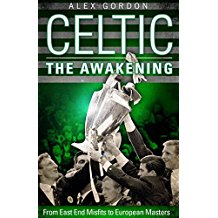
* TOMORROW: CQN’s exclusive extracts of Alex Gordon’s book. ‘CELTIC: The Awakening’,will continue with the team going into 1967, the most glorious year in the club’s history. Don’t miss the next dramatic instalment – only in your champion CQN.

